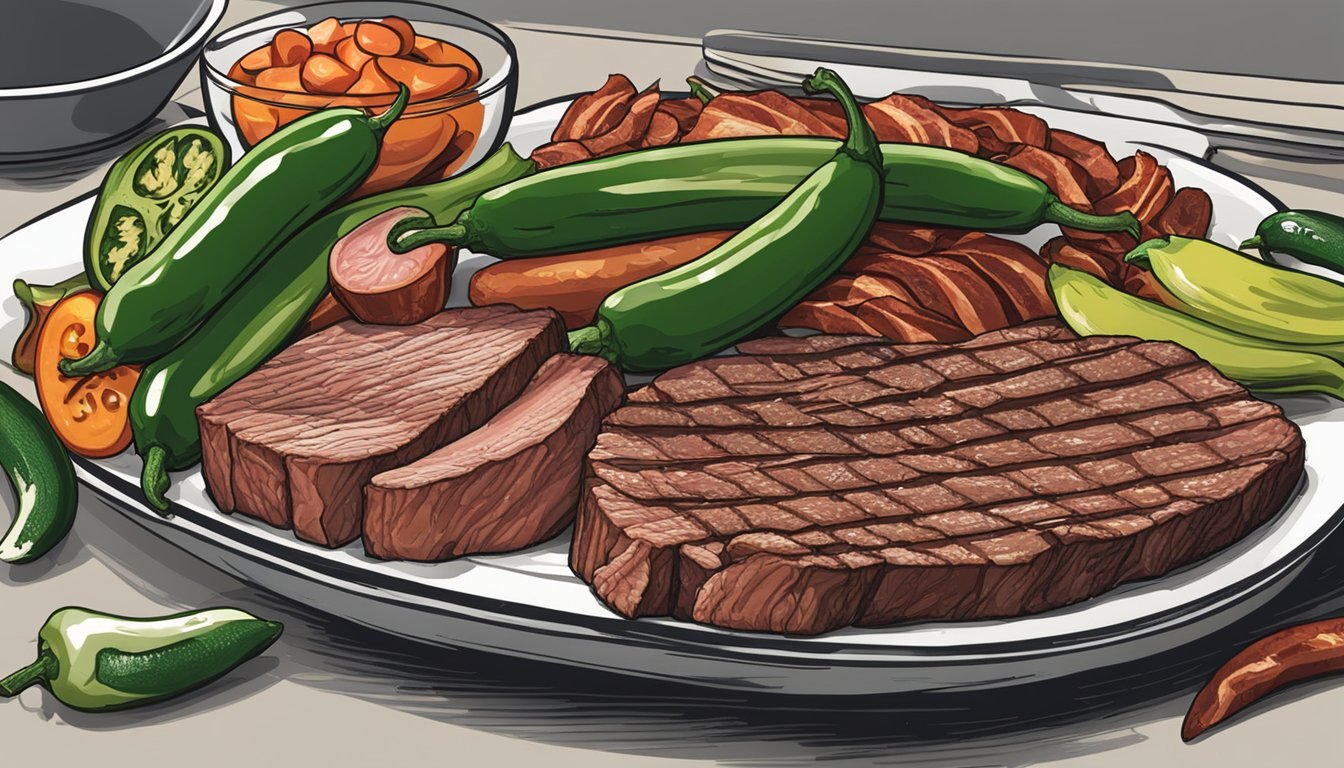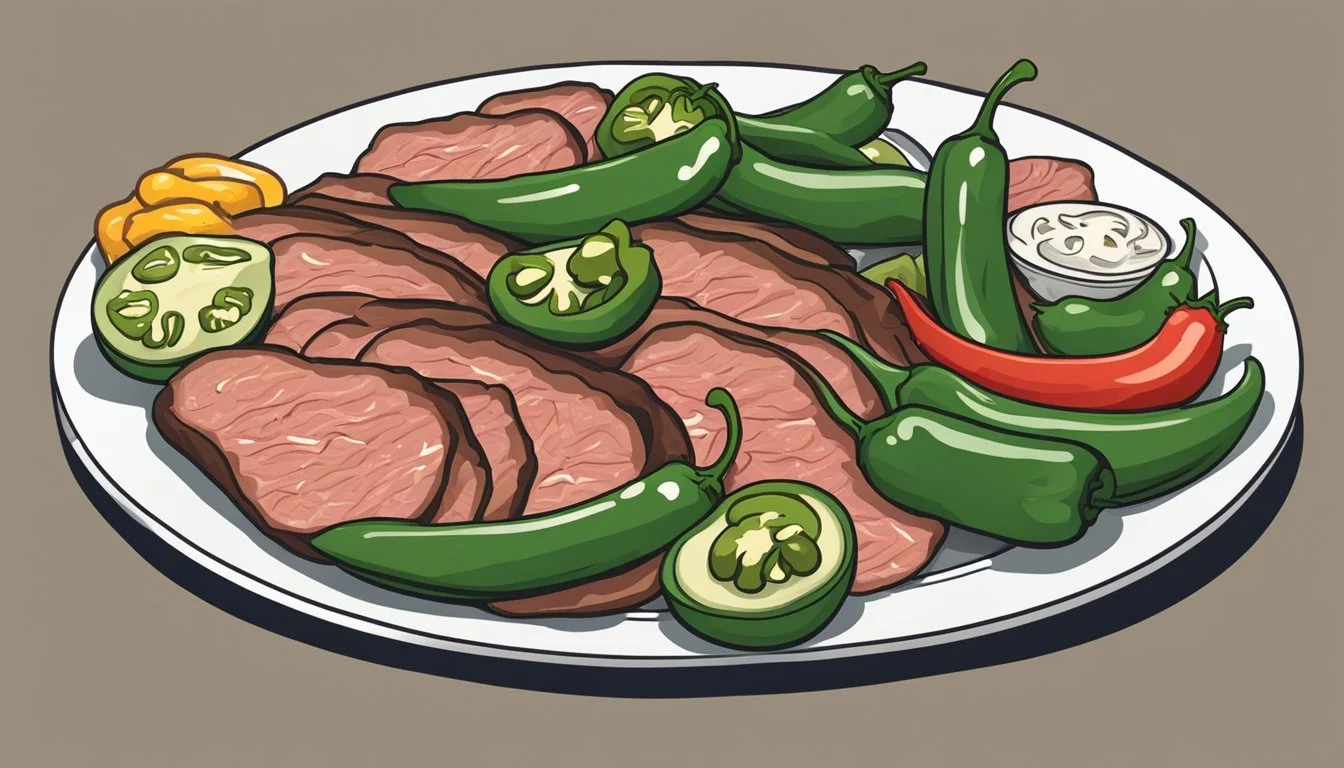Can You Eat Jalapenos on a Carnivore Diet
Spice Up Your Meat-Only Menu
The carnivore diet is characterized by a strict regimen of consuming only animal products such as meat, seafood, eggs, and certain dairy items. Supporters of the diet emphasize a focus on high-quality, nutrient-dense sources of meat and argue that the diet can offer health benefits, including weight loss and simplified meal planning. However, when it comes to incorporating plant-based items like jalapeños, the carnivore community is divided.
Jalapeños are known for their spicy flavor and are a popular seasoning in many cuisines, particularly Mexican. They contain vitamins and can add a lively kick to dishes. While the foundational principles of the carnivore diet exclude plant-based foods, some adherents adopt a more flexible approach. In these cases, small amounts of plant-based seasonings, such as jalapeños, may find their way into the diet primarily for flavor enhancement. However, the addition of any plant-based food, including jalapeños, to a carnivore diet is a departure from the diet's strictest interpretations.
It is important for individuals to consider their own dietary goals and health needs when determining whether to include items like jalapeños in their carnivore diet. Those adhering to a strict carnivore lifestyle will likely exclude jalapeños altogether, while others seeking to maintain the flavor profile of their meals might choose to incorporate such seasonings sparingly. Consulting with a healthcare provider can also offer guidance tailored to individual health circumstances.
What Is the Carnivore Diet?
The carnivore diet is a strict regimen focusing on the consumption of exclusively animal-based foods, emphasizing meat and fats, and excluding all plant matter.
Core Principles and Foods Included
Meat: Central to the carnivore diet is the consumption of meats, which range from common selections like beef, pork, and chicken, to more specialized options including organ meats. These are considered the diet's staples due to their high protein and fat content which adherents rely on for their daily energy and nutrient intake.
Fats: Fats play a crucial role, with a preference for those naturally occurring in animal products. This includes fats from cuts of meat with higher fat content or fats rendered during cooking.
Animal Products: Beyond muscle meats, the diet incorporates other animal-derived products:
Dairy: Some followers include high-fat dairy products such as cheese and butter, although they are often chosen based on their low carbohydrate content.
Eggs: A versatile component, eggs are encouraged for their rich nutrient profile and adaptability in meals.
Seafood: A source of omega-3 fatty acids and other essential nutrients, various forms of seafood are also included within the carnivore diet.
The Exclusion of Plant-Based Foods
The strictest versions of the carnivore diet eliminate all plant-based foods. This means no fruits, vegetables, grains, nuts, seeds, or legumes. The rationale behind this exclusion rests on the belief that animal products alone can provide all necessary nutrients for the human body without the need for plant-derived foods.
Nutritional Overview of Jalapenos
Jalapenos provide a variety of vitamins and minerals while also containing carbohydrates and fiber. Their nutritional value makes them a notable addition to diets for those who wish to include them.
Vitamin and Mineral Content
Jalapenos are a rich source of Vitamin C, which is essential for the immune system, skin health, and maintenance of connective tissue. A single jalapeno pepper contains a significant percentage of the Recommended Dietary Allowance (RDA) for Vitamin C.
Vitamin C: Vital for immune defense and collagen synthesis.
Along with Vitamin C, jalapenos offer a spectrum of other essential nutrients.
Vitamin A: Important for vision and the immune system.
Vitamin K: Key in the body’s blood clotting process.
Potassium: Crucial for heart function and plays a key role in skeletal and smooth muscle contraction, making it important for normal digestive and muscular function.
Carbohydrates and Fiber in Jalapenos
Jalapenos contain carbohydrates, which are the body's primary source of energy. However, they are low in carbs and can be included in a diet that monitors carbohydrate intake.
Carbohydrates: Ranges from 0.5 to 1 gram per jalapeno pepper.
Fiber is an important component of jalapenos, supporting digestive health and contributing to a feeling of fullness.
Fiber: Approximately 0.4 grams per medium-sized jalapeno pepper.
These peppers also contain antioxidants, which can combat oxidative stress and may reduce the risk of chronic diseases.
The Role of Vegetables in a Carnivore Diet
In the context of a carnivore diet, vegetables are typically excluded as this dietary approach emphasizes the exclusive consumption of animal products. Yet, some adherents may consider the occasional inclusion of certain types of vegetation like spices for flavor enhancement.
Potential Benefits and Downsides
Benefits:
Nutrient Diversity: Some argue that including vegetables such as jalapeños may provide additional nutrients not typically found in meats, such as Vitamin C and various phytochemicals.
Digestive Aid: Vegetables like jalapeños may offer digestive benefits due to their fiber content, potentially aiding individuals who may need help with regular bowel movements while on the primarily meat-focused diet.
Downsides:
Purity of Diet: Purists believe that even minimal plant consumption deviates from the true carnivore diet principles, potentially leading to unintended effects on digestion and overall dietary outcomes.
Nutrient Interaction: Certain nutrients and anti-nutrients within vegetables might interfere with the absorption of meat-derived nutrients, altering the expected nutritional balance.
Comparative Analysis With Meat Nutrients
Vitamin A
Meat Source: Liver, fish
Vegetable Source: Leafy greens
Vitamin K
Meat Source: Organ meats
Vegetable Source: Green vegetables
Minerals
Meat Source: Red meats, seafood
Vegetable Source: Various vegetables
Meat-centric Nutrient Profile:
Animal products are rich in essential nutrients like Vitamin B12, heme iron, and omega-3 fatty acids, which are not naturally present in vegetables.
Meats provide a high-quality, complete protein with all essential amino acids, which is not always the case with plant-based proteins.
Vegetable-centric Nutrient Profile:
Vegetables can offer nutrients such as Vitamin C and certain dietary fiber, which are absent or found in lower quantities in meat.
Plant foods typically contain minerals like potassium and magnesium, and vitamins like A and K, which are also essential for maintaining health.
In concluding this section, those considering the carnivore diet must weigh the potential nutritional benefits against the prescribed dietary restrictions, carefully examining any decision to include vegetables for their personal health goals.
Health Benefits and Risks of the Carnivore Diet
Adopting a carnivore diet can influence various aspects of health, from potential weight loss and altered energy levels to effects on chronic diseases and immune function. While some individuals report positive health outcomes, others may experience risks associated with this diet's restrictive nature.
Weight Loss and Energy Levels
Individuals on the carnivore diet often report weight loss as a benefit, which may result from a reduced caloric intake due to the satiating nature of protein and fat. The diet's high-protein content can help preserve muscle mass during weight loss, potentially increasing metabolic rate. Some individuals also experience a boost in energy levels, which could be related to the stabilization of blood sugar, as a diet rich in animal protein and fat can lead to lower insulin variability compared to diets high in carbohydrates.
Impact on the Immune System and Chronic Disease
The carnivore diet's impact on the immune system and chronic diseases such as diabetes is complex. The removal of plant-based foods can eliminate certain food triggers that may cause inflammation or auto-immune responses in some people. However, the diet's emphasis on saturated fat from animal sources could create a risk for heart disease by potentially elevating cholesterol levels. Additionally, the lack of dietary fiber in the carnivore diet could have negative implications for gut health. The long-term absence of plant-derived nutrients could possibly lead to deficiencies that may impair immune function and exacerbate certain chronic diseases.
Incorporating Jalapenos into a Carnivore Meal Plan
Jalapenos can add a spicy twist to the restrictive carnivore diet, which traditionally consists of animal products only. This unconventional inclusion might be adapted to personal preferences, focusing on flavor without compromising the diet's fundamental principles.
Carnivore Diet Food List Adaptations
The carnivore diet typically limits one to consume only animal products—including meats, seafood, eggs, and certain dairy products. Spices and seasonings come under considerable scrutiny; however, jalapenos can be classified as an acceptable spice for many adhering to this diet. Those who choose to include jalapenos do so in moderate quantities to enhance the taste of their meals.
Acceptable
Meat
Fish
Eggs
Hard cheeses
Items for Moderate Use
Jalapeños
Not Included in Carnivore Diet
Plant-based foods
Grains
Sugars
Fruits
Recipe Ideas and Preparation Tips
In living up to carnivore diet standards, incorporating jalapenos must be done with caution, treating them as a flavor enhancer rather than a main ingredient. Here are a couple of ways jalapenos can be utilized:
Spicy Meat Marinade: Deseed and finely chop jalapenos, mix with salt, and use the blend to season cuts of meat before cooking to introduce a fiery flavor profile.
Cheese Omelette with a Kick: Finely diced jalapenos can be added to an omelette comprising pork sausage and hard cheese like cheddar, to create a breakfast dish with added zest.
For those opting jalapenos in their meal plan, they should ensure the rest of the meal remains within the bounds of the carnivore diet's food list to stay true to its principles.
Customizing the Carnivore Diet
The Carnivore Diet typically centers on animal products, but individuals can tailor it to their preferences, sometimes including spices and seasonings.
Strict vs. Relaxed Approach
The strict carnivore diet is characterized by its exclusive focus on animal products: meats, seafood, organs, and eggs. This approach often follows a nose to tail philosophy, which includes consuming all parts of the animal to maximize nutrient intake.
Conversely, the relaxed approach allows for some flexibility. Adherents to this version may incorporate limited amounts of non-animal products, such as certain spices and seasonings, to enhance the flavor of meals. They might also include specific dairy items.
Inclusion of Spices and Seasonings
While a strict carnivore diet generally excludes plant matter, those following a relaxed approach might choose to incorporate spices and seasonings for variety. This can include:
Salt and Pepper: Essentials for most, used to enhance the natural flavors of the meat.
Herbs and Spices: Many on the relaxed carnivore diet will occasionally add small amounts of garlic powder, paprika, or other spices, such as jalapeños, understanding that moderation is key.
It should be noted that the addition of these items is typically minimal, as the primary focus of the carnivore diet remains on animal-based products.
Take advantage of the wide variety of online options when shopping for salt, pepper, garlic powder, and paprika !
Concerns and Considerations
When incorporating jalapenos into a carnivore diet, individuals should consider the impact on their nutritional balance and the broader implications of their dietary choices.
Nutrient Deficiencies
The carnivore diet, by excluding plant-based foods, inherently lacks certain nutrients that are vital for optimal health. Jalapenos can offer some vitamin C and folate, nutrients typically scarce in an all-meat diet:
Vitamin C: Essential for immune function and collagen synthesis, it’s found in fresh vegetables but not in significant quantities in meat.
Folate: Important for cell growth and function, folate is present in green vegetables but not adequately supplied by animal products.
However, jalapenos are consumed in small quantities and thus contribute minimally to meeting the daily recommended intake. Individuals on a carnivore diet may need to monitor and manage potential deficiencies, specifically in:
Fiber: Promotes digestive health and is absent in animal products.
B Vitamins: While meats are a good source of certain B vitamins like B12, plant-based foods provide others like B1 (thiamine), B3 (niacin), and B9 (folate).
Get the best value for your money by purchasing vitamin C and folate online!
Sustainability and Ethical Aspects
Adherence to a carnivore diet raises questions of sustainability and ethics. The diet's heavy reliance on animal products comes with a significant environmental footprint due to resource-intensive meat production. By incorporating jalapenos, individuals can slightly reduce their meat consumption, potentially mitigating these concerns:
Water and Land Use: Growing jalapenos requires less water and land compared to raising livestock.
Greenhouse Gases: Plant agriculture typically generates fewer greenhouse gases than meat production.
Ethical considerations also come into play regarding animal welfare and the use of resources. Diversifying even minimally with plant inclusions such as jalapenos may align with a more sustainable approach to dieting. However, the actual impact is minimal given that jalapenos are generally used as a spice rather than a staple food.
Frequently Asked Questions
In this section, readers will find clear and concise answers to common questions about the incorporation of jalapenos into a carnivore diet.
Addressing Common Confusions
Can one eat jalapenos on a carnivore diet? Yes, one can consume jalapenos on a carnivore diet in moderation. While the carnivore diet primarily focuses on animal products and protein intake, some adherents choose to include spices like jalapenos for flavor.
Jalapenos: Considered a spice on a carnivore diet.
Carnivore Diet: Constitutes mainly of high-protein, fat-rich animal foods.
Protein Intake: Main focus is on meats, fish, eggs, and certain dairy products.
Practical Tips for Beginners
For beginners, effectively integrating jalapenos into a carnivore diet requires an understanding of the diet's main principles. Here are practical tips:
Start simple: Begin with the standard carnivore diet of meat, seafood, and eggs to establish a baseline.
Moderation: Introduce jalapenos gradually and in small amounts if desired for taste.
Flavoring: Use diced or powdered jalapenos sparingly.
Cooking: Consider adding jalapenos to meat dishes during preparation for enhanced flavor.
Conclusion
The carnivore diet emphasizes the consumption of animal products and excludes plant-based foods. Within this eating pattern, meat, seafood, eggs, and certain dairy products are the staples, providing the essential nutrients and energy required by the body.
Inclusion of jalapeños, as part of the spices and seasonings category, falls into a gray area. Although not a primary food source in the carnivore diet, they can be used moderately to enhance flavor, especially considering these peppers do have a nutritional profile that includes vitamins and minerals.
Individuals following this diet should consider the potential benefits and limitations of integrating such non-animal based items. The primary goal is to focus on meat consumption to sustain a diet rich in protein and fat, which are vital for maintaining muscle mass and supporting overall health.
One must also keep in mind that while the carnivore diet has proponents, it inherently lacks the variety found in a more balanced diet. Anyone considering this dietary approach should weigh the benefits of a focused meat-centric intake against the broader nutritional benefits provided by a diverse range of foods.
In summary, when adhering to a carnivore eating plan, it is generally acceptable to introduce jalapeños in limited quantities. Careful consideration of personal health goals and nutritional balance is advised, and consulting with a healthcare provider before making significant dietary changes is recommended.













